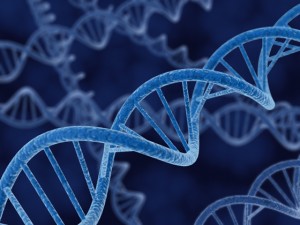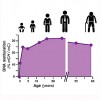Controlling gene expression through diet
 Epigenetics is the study of chemical reactions that control the on and off switch of genes at specific times and the factors influencing them. Environment is a factor that influences epigenetic change which may encompass behavior, stress or diet. The easiest of the three to make observations from is diet. When we think of food, rarely do we think of chemical modifications to DNA and restriction of gene activity. Commonly we think of foods coming in and being broken down into nutrients to be utilized in metabolic pathways to make components the body can use. Interestingly one of the pathways utilized produces methyl groups, the chemical (epigenetic) tags used to shut off genes. Research has shown that diets rich in methyl donating nutrients in early development and as an infant can cause lasting changes.
Epigenetics is the study of chemical reactions that control the on and off switch of genes at specific times and the factors influencing them. Environment is a factor that influences epigenetic change which may encompass behavior, stress or diet. The easiest of the three to make observations from is diet. When we think of food, rarely do we think of chemical modifications to DNA and restriction of gene activity. Commonly we think of foods coming in and being broken down into nutrients to be utilized in metabolic pathways to make components the body can use. Interestingly one of the pathways utilized produces methyl groups, the chemical (epigenetic) tags used to shut off genes. Research has shown that diets rich in methyl donating nutrients in early development and as an infant can cause lasting changes.
Well what do I mean by lasting changes? Research has shown that depending on what your mother eats may influence your genes and health in the long run. The gene agouti is found in humans and mice. The agouti/melanocortin system is an important regulator of body weight homeostasis. Mouse studies have shown that when the agouti gene is not methylated the result is obese yellow coated mice which may be at risk for cancer and diabetes. When the gene is methylated mice are brown, of normal weight and size. The only difference between the two types of mice is the methylation control on the agouti gene. In parallel experiments were carried out where yellow female mice were fed a methyl enriched diet; the offspring grew to be normal weight, size and were brown in color and remained so for the rest of their adulthood. This study identified that an individual’s wellbeing is not only determined by what they eat but also what their parents ate.
References
Nutrition and the epigenome. Retrieved February 8, 2012, from http://learn.genetics.utah.edu/content/epigenetics/nutrition/
| Print article | This entry was posted by Jermel Watkins on February 16, 2012 at 10:30 am, and is filed under Your Genes, Your Health. Follow any responses to this post through RSS 2.0. You can leave a response or trackback from your own site. |










